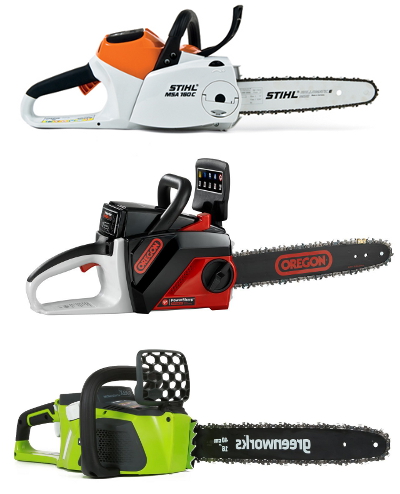
Best battery-powered chainsaw
 When we started researching battery-powered chainsaws,
I quickly narrowed down the options to three for serious
homesteaders. I actually asked each of these manufacturers for a
review saw, with varied results --- Stihl didn't even answer my query,
Greenworks turned me down, and Oregon sent out the sample saw we've been playing with.
Since we've only had the pleasure of trying out one of the options,
this comparison is largely based on reviews from other sites, combined
with firsthand information from the Oregon saw.
When we started researching battery-powered chainsaws,
I quickly narrowed down the options to three for serious
homesteaders. I actually asked each of these manufacturers for a
review saw, with varied results --- Stihl didn't even answer my query,
Greenworks turned me down, and Oregon sent out the sample saw we've been playing with.
Since we've only had the pleasure of trying out one of the options,
this comparison is largely based on reviews from other sites, combined
with firsthand information from the Oregon saw.
Stihl makes a battery-powered saw (MSA 160 C-BQ)
that might head the pack. However, it's hard to get any solid
data on how the saw operates since Stihl only sells through their
dealers, so online reviews are scanty. The price at our local
dealer is $329.95 plus the cost
of the 36V battery (an additional $260), making this the most expensive option by far. However, one review site
felt like the Stihl saw was twice as fast and cut twice as long as the
Oregon saw, so if you want a battery chainsaw to take over all of the
work of a gas saw, this might be the right choice for you.
Oregon makes the chainsaw that looked the most enticing from Amazon reviews (CS250).
The saw costs $249 with no battery, $349 with the smallest available
battery, and $449 with the largest available battery (which is what we're using). In addition
to being in the power class (40V) that is somewhat comparable with
gas-powered chainsaws, the CS250 has the added perk of having a stone
built into the saw so you can sharpen your chain with the pull of a
lever. I suspect that this feature will prove to be especially handy since a
battery saws are very sensitive to dull chains that make the motor
work harder. Reviewers (and our own experience) suggest that one  battery
will cut for about an
hour and that the saw can easily buck trees up to 9 to 12 inches in
diameter
(depending on the hardness of the wood). In a pinch you can cut
down larger trees as well --- our saw made it through a 17-inch
box-elder (a soft wood) without much trouble, but the job did require a
faster battery charge than usual. As a side note, if you cut too
aggressively, the Oregon saw will shut off to protect the motor, which we've only noticed once but which some reviewers have had trouble with.
battery
will cut for about an
hour and that the saw can easily buck trees up to 9 to 12 inches in
diameter
(depending on the hardness of the wood). In a pinch you can cut
down larger trees as well --- our saw made it through a 17-inch
box-elder (a soft wood) without much trouble, but the job did require a
faster battery charge than usual. As a side note, if you cut too
aggressively, the Oregon saw will shut off to protect the motor, which we've only noticed once but which some reviewers have had trouble with.
Greenworks sells a saw (20312 DigiPro) that is cheaper but possibly less powerful than Oregon's offering. On Amazon, Greenworks' saw
costs $140 with no battery, or $267 with a battery equivalent to
Oregon's largest.
The lower price seems to equate to a slightly less powerful saw (even
though the batteries are 40V just like Oregon's). On the other hand, it's hard to
say whether the possibly shorter run time and reported struggle with
bigger trees is just a result of the larger bar making people more
likely to be overambitious.
I'd love to hear from
anyone who has used these saws and can provide first-hand
information. Do you feel like your saw is able to handle
moderate-scale homesteading tasks, even if it would lose a battle
against a gas-powered chainsaw? Why did you choose the model you
ended up bringing home?
Want more in-depth information? Browse through our books.
Or explore more posts by date or by subject.
About us: Anna Hess and Mark Hamilton spent over a decade living self-sufficiently in the mountains of Virginia before moving north to start over from scratch in the foothills of Ohio. They've experimented with permaculture, no-till gardening, trailersteading, home-based microbusinesses and much more, writing about their adventures in both blogs and books.
Want to be notified when new comments are posted on this page? Click on the RSS button after you add a comment to subscribe to the comment feed, or simply check the box beside "email replies to me" while writing your comment.

For almost all of the cutting that a battery chainsaw does, I really like using my DeWalt 18v reciprocating saw with a 12" pruning blade. Quick and easy for almost everything that is wrist-ish thick. I can get a 50 ft. ash tree cut down and in the truck with less than a tank of fuel, then have the big stuff completely cut to length with another while the reciprocating saw takes care of the rest. In addition, I get the versatility of being able to cut metal with a simple blade swap, and I can share batteries with my cordless drill. In totality it is cheaper, and more versatile. Since you can pick up a 12v charger online, you can charge with solar or a truck's electrics off the shelf. Finally, if you're working in a brush pile, it's safer and easier to use. The further out you are, the more this makes a difference.
For my money, this is one of the 'core tools' that I'd want.
I have enjoyed your reviews on this oregon chain saw, as I am older and so many times I need the versatility of the battery, plus the built in sharpen. I have firewood delivered and many times I need to cut some of the logs to fit stove. I also use the dewalt resipiacating saw with the pruning blades but it is not as comfortable as I would feel with the battery operated orgeon chain saw. Seriously thinking of purchasing one. I will keep looking for more reviews. thank mark for all your Input.
I have the Greenworks 16" 40v DigiMax. It is perfect for my occasional chainsaw need. No cord, no small engine, yet still plenty of power for brush and small trees.
Only concern I have is what to do if it breaks down. Stihl gas products are expensive, but repair facilities are everywhere.
I have had the Greenworks 16" 40V saw for 1.5 years and have done quite a bit of work with it. It is professional grade quality and can be used on large diameter wood.
Before the Greenworks I had two gas saws, a 16 and 20 inch. I bought this to replace the 16" but it is so good that I haven't used the 20" since. The stress on the user is so much less with the quietness and great trigger control, that I have been able to cut a great deal of wood, most of it lying on the ground, without having to sharpen the chain yet. With the amount the saw has been used, I would have expected it to need sharpening three times by now. I can cut with more precision and patience, so I guess I'm not hitting dirt with this chain nearly as much. This makes it safer too, and it's nice cutting down trees with because you can hear the wood splintering just before the tree starts falling on its own.
This saw is a way better tool than anything that came before it. I wouldn't use it for really big logs but anything up to about 24" diameter should be fine.